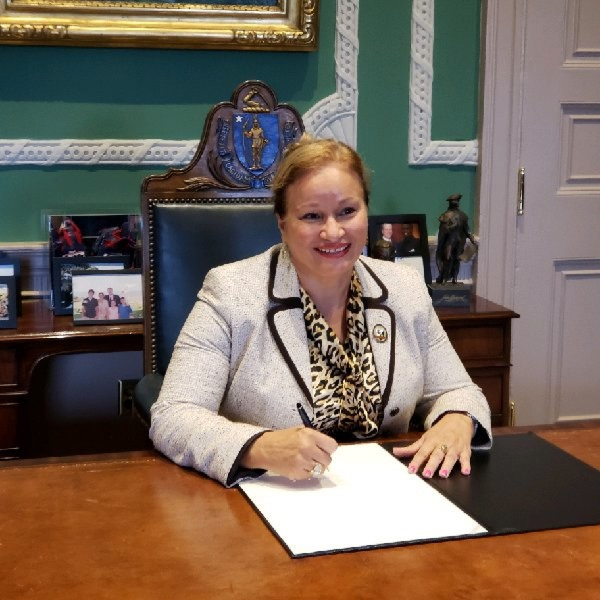
By Andre LaFontant
Commissioner Monserrate Quiñones is a diversity and inclusion expert appointed by Governor Charlie Baker in 2017, to serve as a Commissioner of the Massachusetts Commission Against Discrimination (MCAD). Over the course of a nineteen-year career in state government leadership, Quiñones has fought passionately for civil rights, inclusion, and equal access. Quiñones obtained her Bachelor’s of Science in Education with a concentration in human services from the University of Massachusetts Amherst. She earned a Master’s of Science in Nonprofit Management from Worcester State University. The following interview delves into her perspective on the value and urgency of diversity and inclusion in Massachusetts’ legal and business environments.
Andre LaFontant: Can you tell me more about your role as Commissioner for MCAD?
Monserrate Quiñones: As a Commissioner, I oversee investigations of Complaints of Discrimination that arise in Central and Western Massachusetts. I conduct mediations and direct staff attorneys who are prosecuting cases as my designee. I also issue Full Commission Decisions with my colleagues, which is a final appeal after a public hearing. In this role, I work to protect people from unfair treatment in the areas of employment, housing, public places, lending, credit, and school admissions.
What is a common misconception about what you do?
A lot of people think that when they file at the MCAD, we become their attorney free of charge. The MCAD, however, is a state agency that is neutral during its investigations. We don’t take sides, and we don’t represent either party. If we find that a Complaint is more likely than not to be discrimination, then the case will advance to conciliation. If the Complainant does not have an attorney at this time, the MCAD will assign a staff attorney (called Commission Counsel) to prosecute the case in the public interest on behalf of the people of the Commonwealth. The Commission Counsel will work with the Complainant when the state interest and the individual interest align, but the MCAD is not the Complainant’s attorney.
In your opinion, what skills are necessary to be an effective leader?
In my opinion, two of the most important attributes of a leader are self-awareness and self-reflection. Having an understanding of one’s own strengths and weaknesses is a key to leading, managing, and using people’s talents and abilities most effectively in an organization. The ability to trust those around you to accomplish great things through their own efforts, at times, requires putting one’s ego aside and providing the tools needed to allow others to be leaders in their own right is so critical. Empowering others to act, to question, to challenge the status quo in a safe working environment is one of the greatest privileges of being a leader. This requires a leader to be like a symphony conductor who stands firm in front of the many different instruments at their disposal and creates by giving permission to perform and shine at the right tempo and rhythm.
Looking ahead, how can organizations ensure they remain relevant and effective as the D&I landscape shifts in the US?
There is no doubt that there is a lot of competition for talent. I have not seen any scarcity when it comes to the availability of an educated and skilled workforce pool. Organizations cannot just give lip service to D&I because candidates are very discernible. All the information about the company, leadership, and opportunities for succession planning for people of color and other diverse folks is available upfront. If diverse candidates do not see themselves represented in positions of leadership in the hierarchy the message is clear. Leadership has to elevate and take seriously the business case of D&I. Things cannot be done in the same old way when it comes to creating an environment for inclusion.
What role does the creation of employee networks like employee resource groups play in creating a diverse and inclusive work environment?
Employee resource groups work both inwardly and outwardly to elevate group members as well as their companies as a whole by providing opportunities to champion programs and recognize people—which is a company’s greatest asset. They often give advice and counsel to the company and the senior diversity and inclusion officer, as well as provide crucial buy-in from the employees. These groups aid in recruitment, retention, mentoring, leadership development, and creating a positive and supportive work environment. Affinity group members become ambassadors for the company and provide immeasurable goodwill with the public. Perhaps most critically, they lead other employees toward better cultural understanding.
Looking back on your life and career, what does it mean to be a person of Color in 2019?
I came from a very humble family. My father cut sugarcane and my mother worked in the home raising six children. I am the youngest. Times were very hard in Puerto Rico back then. My parents only made it to the third grade because they had to work the farm to help feed the family when they were growing up. My family came to Massachusetts in 1968 to Framingham because others in my village of Guayama came to work in the manufacturing factories there. Only one brother and I had the opportunity to go to college.
Today and from a distance, the landscape looks remarkably more diverse compared to the 1980s when I entered the workforce as a professional. However, when you take a closer look there are many strongholds in various industries where people of color are just not represented. As for me, at most tables I sit in or place I go representing the MCAD, I am the only Latina in the room. I feel very blessed and privileged for all the opportunities I have had in my twenty-eight-year career in state government. Mentoring and guiding other people of color along is my passion. It is my duty to give back in any way possible.


